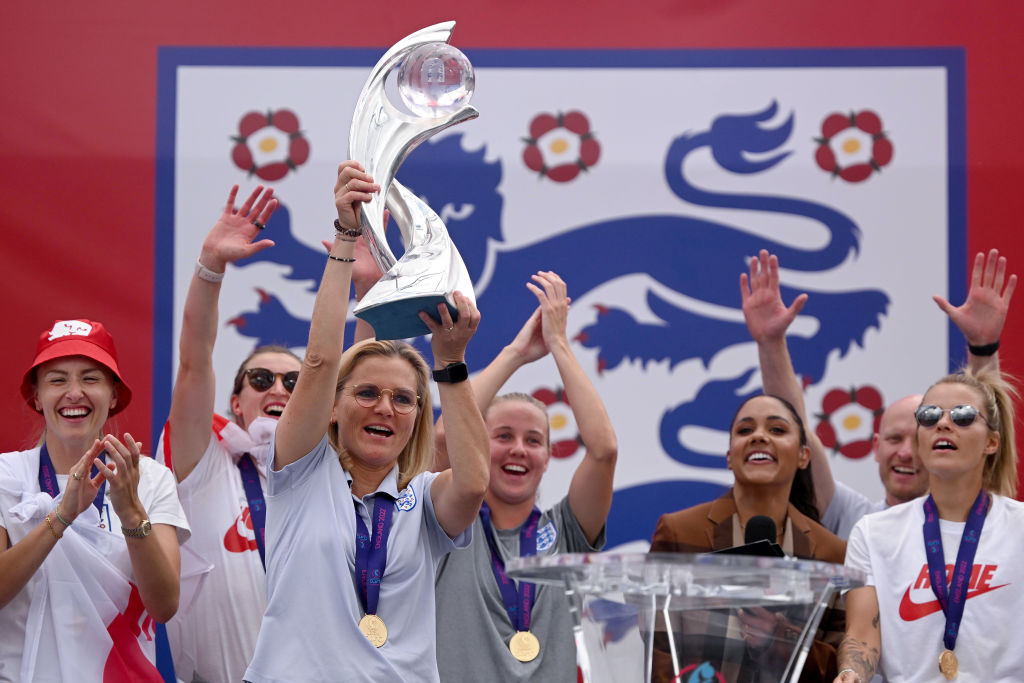The Women’s Euros smashed records. Now we need more women on football club boards

Women’s Euro 2022 broke new records for football and it’s clear that brands are now recognising the commercial value of the women’s game.
Spurred on by rising professionalism, for the first time ever, every one of the top-20 revenue generating clubs in world football now has a women’s team.
Off the pitch though, it’s a different story. Of these top clubs, on average women make up just 11 per cent of boards, and in some cases 0 per cent, while diversity figures for the industry look even worse when we consider representation of ethnic minorities.
In comparison, nearly 40 per cent of UK FTSE 100 board positions are now held by women, while research has proved that companies with a higher number of female executives are more profitable.
It is time for the sports industry, and in particular football clubs, to catch up. The critical question is: how?
When addressing female representation, there are two key issues. First, the challenge of cultural “fit” at board level, and second, the ever-diminishing pool of female candidates climbing club leadership ladders.
Challenging the ‘fit’ of club boards
At board and C-suite levels, clubs must learn to reconcile the idea of “fit” as, anecdotally, we have seen that boards often recruit leaders with a similar type of background and experience.
To encourage stronger diversity, there are continued debates for the necessity of targets to mandate that a certain number of board positions must be filled by women.
While the merits of this are clear, so too is the need for balance to avoid the risk of tokenism.
Some recent criticism of Women’s Euros coverage argued that commentators were too kind on the women’s game and ran the risk of endangering its credibility.
The same criticism is likely to be seen if clubs champion diversity initiatives purely as they are “the right thing to do”.
It’s a stark reality that for too long gender bias has left talented female leaders on the bench.
Challenging the traditional recruitment of board members and raising awareness of available positions among a more diverse group of potential applicants can break down exclusive entry standards and ensure the skills and experiences of these leaders are put to good use on club boards.
Creating allies
Raising awareness of the barriers to female progression across the industry is key, with bias often held up as hampering many career trajectories.
Challenging bias will help to create a culture that supports a wider group of people into leadership positions.
Research can help to inform this, pinpointing the “broken rungs” in career ladders. For instance, one study highlighted that within job interviews men are often promoted on potential whereas women are judged on experience so far, which encouraged discussion on how to create a more inclusive interview experience.
Alongside this, opening conversations on improving inclusion can help to shine a spotlight on personal experiences, encouraging individuals to share theirs and constructive steps that can be taken to avoid these pitfalls in the future.
Women’s networks and events, which bring together male and female representatives and encourage allyship are a great tool for this.
Setting stepping stones for progress will lay a path for aspiring female leaders to tread and inspire others to follow in their footsteps.
Building a virtuous circle
Scenes from Euro 2022 have demonstrated the success of the global industry’s focus on growing the women’s game, inspiring a generation of future female football stars, fans and improved commercial rewards.
We now have the opportunity to use this as a platform to grow female representation off the pitch.
The reality is that investing more in the women’s game, alongside improving gender diversity across club workforces and bringing more women into boardrooms could create a virtuous circle, propelling greater financial returns to spark growth across every corner of the industry.
To date, these conversations are still happening too quietly and sporadically. We must work together as an industry to challenge each other, using the success of the championship to ensure we are supporting gender parity off the pitch as much as we are celebrating the success of female players on it.
Amy Clarke is a manager in Deloitte’s Sports Business Group.